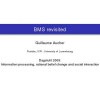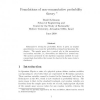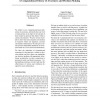137
click to vote
TARK
2009
Springer
15 years 8 months ago
2009
Springer
We study games in which the choices available to players are not fixed, and may change during the course of play. Specifically, we consider a model in which players may switch st...
138
click to vote
TARK
2009
Springer
15 years 8 months ago
2009
Springer
Kolmogorov’s setting for probability theory is given an original generalization to account for probabilities arising from Quantum Mechanics. The sample space has a central role ...
206
click to vote
TARK
2009
Springer
15 years 8 months ago
2009
Springer
We exhibit a new computational-based definition of awareness, informally that our level of unawareness of an object is the amount of time needed to generate that object within a ...
108
click to vote
TARK
2009
Springer
15 years 8 months ago
2009
Springer
Tennenholtz (GEB 2004) developed Program Equilibrium to model play in a finite twoplayer game where each player can base their strategy on the other player’s strategies. Tennen...
132
click to vote
TARK
2009
Springer
15 years 8 months ago
2009
Springer
The logical omniscience feature assumes that an epistemic agent knows all logical consequences of her assumptions. This paper offers a general theoretical framework that views log...
110
click to vote
TARK
2009
Springer
15 years 8 months ago
2009
Springer
Brandenburger, Friedenberg, and Keisler provide an epistemic characterization of iterated admissibility (i.e., iterated deletion of weakly dominated strategies) where uncertainty ...
136
click to vote
TARK
2009
Springer
15 years 8 months ago
2009
Springer
In numerous economic scenarios, contracting parties may not have a clear picture of all the relevant aspects. While confronted with these unawareness issues, the strategic decisio...



